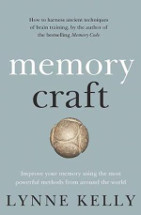Memory craft by Lynne Kelly

Allen and Unwin, 2019. ISBN: 9781760633059.
(Age: Adult) The Melbourne author used knowledge gained from her PhD
research on memory to detail elaborate methods/structures for
memorising large quantities of data eg whole dictionaries!
The book also contends that these methods eg memory palaces were
used throughout history. Before the written word, most cultures used
visual mapping, stories, dance, songs, etc to 'store' and pass on
culture. In medieval times, visual alphabets and illustrated
bestiaries were used as memory aides.
The author argues that while repetition (so knowledge is stored in
long term memory) is an important element of memory recall, it is
not enough. Attaching the knowledge/data to 'memory spaces' is also
necessary. This is evident in the world of memory competitions
detailed in another chapter where competitors use the techniques
detailed in the book.
The section detailing how the author learnt French and Chinese would
be very useful for language teachers. Chapter 12 deals with
utilising memory techniques in education with a great example on the
periodic table.
As a research project topic, it would be interesting to trial one of
the methods used.
On a simplistic level, I successfully used elements to remember
various names and terms I have had difficulty with.
In our digital age, it could be argued that memorising and recall of
knowledge is unnecessary, but Ms Kelly argues that the brain
strengthens connections while memorising - it is a muscle that needs
exercise like all other muscles. In relation to education, the
author views memorisation as a way to enhance what we already do in
education'.
While extremely interesting, I found that a high level of
concentration was required for some sections of the beautifully
illustrated book. I was not tempted to try to memorise eg all of
Australian or world history using one of the memory palace
techniques - it seemed too complicated.
This book is more suitable for teachers and general interest rather
than for students.
Ann Griffin